
The photographs here were taken of camels and people in Libya around 1957 by Dr. Virgil Clift.



The photographs here were taken of camels and people in Libya around 1957 by Dr. Virgil Clift.


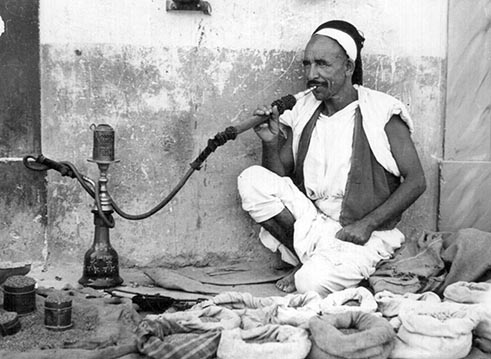
Above and below are two scenes in Tripoli, Libya from the 1950s, when it was still a kingdom. Both are from Christmas and New Years greeting cards with the greeting in English.
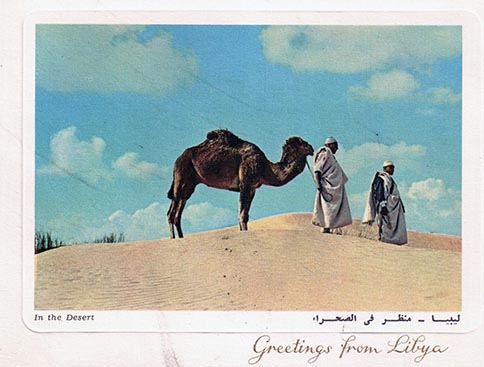 Photo by Jenah in Tripoli; printed in Italy
Photo by Jenah in Tripoli; printed in Italy
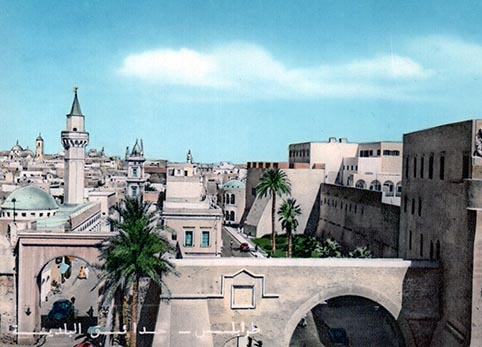 Panorama of Tripoli
Panorama of Tripoli
Above and below are postcards of scenes in Tripoli, Libya from the 1950s, when it was still a kingdom. All of these were distributed by Ediz. Ris. Foto AULA in Tripoli – Rop. vietata.
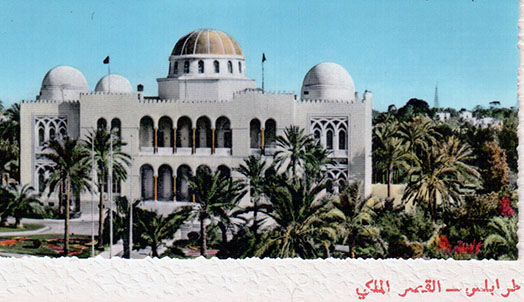 The King’s Palace
The King’s Palace
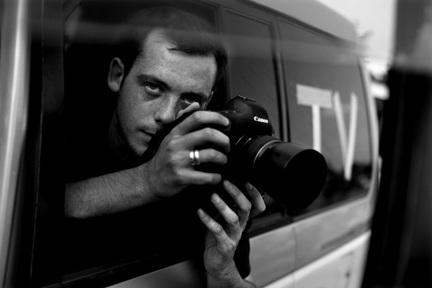
Photographer Rémi Ochlik who was killed last year in Syria at the age of 28 (Photo: Corentin Fohlen)
By Adeline Sire, PRI’s The World, February 1, 2013
Many journalists have died covering the Arab uprisings.
Last year, 17 were killed in Syria.
One of them was award-winning French photojournalist Rémi Ochlik.
He was only 28-years-old.
Ochlik documented the revolutions in Tunisia, Egypt, and Libya.
Then last year, he headed out to Syria. Continue reading Remembering Arab Spring Photographer Rémi Ochlik

Edward Said wrote a poignant critique of media coverage of the Iranian hostage crisis just over three decades ago. He called it “Covering Islam.” The subtitle was “How the Media and the Experts Determine How We See the Rest of the World.” Once again Islam is being covered, the latest being the “cover” on Newsweek Magazine. Said’s [Covering Islam (1997 edition), p. lv.] assessment is as relevant as ever today:
For the right, Islam represents barbarism; for the left, medieval theocracy; for the center, a kind of distasteful exoticism. In all camps there is agreement that even though little enough is known about the Islamic world there is not much to be approved of there.
The latest Newsweek cover demonstrates just how weak its sense of responsible news reporting is. The trope of “Muslim Rage” conflates the cultural dimensions of politics with a religious faith. When Israeli planes bomb Hamas in Gaza, no major newspaper calls this “Jewish Rage.” When Terry Jones burns a Quran or when Anders Behring Breivik shoots fellow Norwegians, I have yet to see a headline of this act as one of “Christian Rage.” Rage is almost always political at base and the events subsumed under a blanket umbrella of “Muslim Rage” are local politics to the core. The fact that we see these images on CNN and the Internet tells us more about the audience than it does about those engaged in the activities.
The photograph captures “rage” to be sure, but the choice of turbaned and bearded protesters (when the majority in Cairo at least are young clean-shaven men in Western clothing lobbing rocks at the police) identifies rage with a style of dress and a style of dress with a violent religion. Ironically, the voices of those who are enraged are not to be heard anywhere inside the story. Instead, the cover boasts an article inside by Aayan Hirsi Ali, a controversial Somali whose claim to fame was posing naked with Quranic verses on her body and then becoming a darling of the Islamophobic mob. Her knowledge of Islam is so immature and biased that the very idea she might have something to contribute to the issue staggers my imagination.
I see little difference between this cover photo and that on the French tabloid Closer, which brandished the privately bared royal breasts of British princess Kate Middleton. Continue reading Newsweak

The past week has seen a dramatic punctuation in the political present. This present is one in which several countries in North Africa and the Middle East are emerging from years of “stable” dictatorial rule in which human rights were ignored by the Western countries who philosophize how important human rights (or at least the right kind of rights) are. There is also a presidential election looming in the most powerful nation on earth, a nation divided in a partisan way with few realistic ideas on how to frame a way out of the greatest economic downturn since the Great Depression. It is raining politics and that is fire and brimstone in the current climate.
The drama starts with the anniversary of the 9/11 tragedy, which like the abduction of Helen of Troy, prodded the United States to engage in two decade-long wars that have resulted in the deaths of former figure-head foes (Saddam and Bin Laden) but which are unwinnable in the old-fashioned “sign a peace treaty and let trade make us friends” sense after World War II. The spark, a most surreal one at that, is a pathetic trailer for the kind of film no one would ever pay money to see. Before Youtube, before the Internet, this would have been yet another throw-away on the huge cinematic rubbish pile already brimming with porn. But in a scenario that a producer would probably laugh away, an Islamophobic individual dubs intentionally hateful dialogue denigrating the Prophet Muhammad. For non-Muslims the main thing offended is taste; for Muslims this is hateful and hurtful, akin to throwing something sacred into a toilet.
The politics has exploded all over the media, not in spits but a massive vomit. Continue reading The “Muslim” Problem
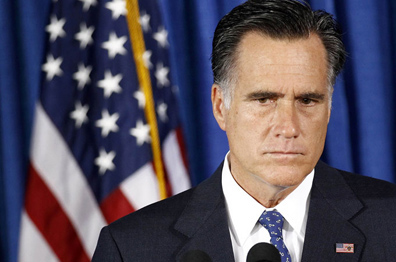
US Republican presidential nominee Mitt Romney listens to questions on the attack on the US consulate in Libya, in Jacksonville, Florida, September 12, 2012. [Reuters]
Romney poses, as militants burn a US consulate over Islamophobic film
By Juan Cole, Al Jazeera, September 14, 2012
As Mitt Romney misfires on the campaign trail; scholar argues that the events in Benghazi are atypical of the new Libya.
Predictably, Republican presidential candidate Mitt Romney tried to make political hay of the tiny demonstrations in Cairo and Benghazi by Muslim militants. The Benghazi mob turned violent in clashes with police and the consulate ended up being burned and an embassy staffers being killed.
Romney seized on the frantic tweets of the Cairo embassy, which condemned the sleazy Youtube videos by American Islamophobes that had provoked the ire of the crowds, as evidence that the Obama administration was sidingwith the attacking mobs. First of all, really? Romney is trying to get elected on the back of a dead US diplomat? Second of all, really? He thinks the State Department thought the attack on themselves was justified? Third of all, really? Romney is selective. When it comes to Christianity, Romney decries a ‘war on religion.’ But apparently he thinks there *should* be a war on Islamic religion. Romney’s intervention (he is just a civilian at the moment) in American foreign policy is unwise and risky, not to mention distasteful. Continue reading Mitt miffs the tweets

An Egyptian protester tries to raise an Islamic flag at the U.S. embassy during a protest, in Cairo, Egypt on September 11, 2012. (Khaled Elfiqi / EPA / September 13, 2012)
Violence in Egypt and Libya is more about local politics than Islam.
By Mimi Hanaoka, LA Times, September 13, 20121
The chaotic violence that killed U.S. Ambassador J. Christopher Stevens and three American staffers in Libya, and that resulted in a mob storming the U.S. Embassy in Cairo, has been garbed in religious language and references. However, the religious rhetoric from all corners distracts from the real issues: serious domestic political fragmentation in Libya and Egypt in the aftermath of the Arab Spring, and America’s place in the region.
Media attention has focused on a polemic 14-minute movie trailer for “Innocence of Muslims” posted on YouTube, which prompted protests in Benghazi and Cairo. The film was allegedly produced by Sam Bacile, who has identified himself as an Israeli Jew. In the Wall Street Journal, Bacile called Islam a “cancer” and claimed he raised $5 million from about 100 Jewish donors to fund the film, details that only intensify the film’s polemic power.
The trailer, translated into Arabic and viewed thousands of times in the Middle East, portrays the prophet Muhammad as, among other things, a child abuser. Florida pastor and provocateur Terry Jones, who burned the Koran in 2011, claims to have screened the film; a self-described Christian militant in California claims to have consulted on it. Continue reading Beyond religion in the Middle East